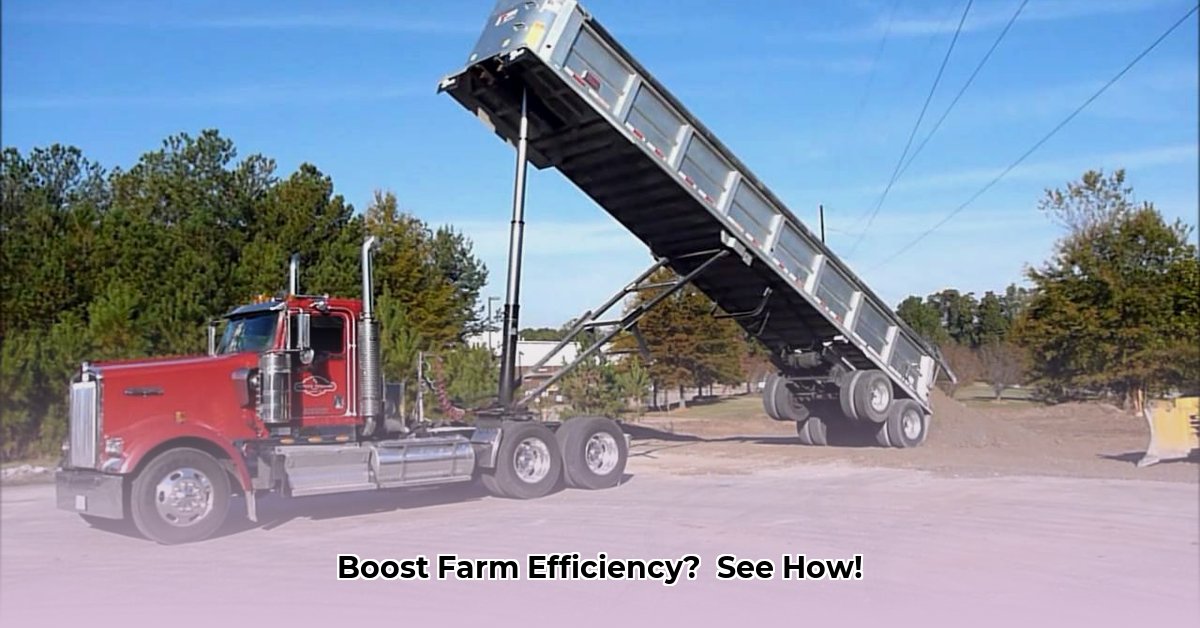
Dump Tractor Trailer: Is the RK XB 1.5-Ton Right for Your Farm?
Choosing the right equipment is paramount for efficient farming. This review examines the RK King Kutter XB 1.5-ton dump tractor trailer, assessing its suitability for various farming operations. Its primary advantage is versatility; it's compatible with both tractors and utility vehicles (UTVs), making it adaptable to diverse farm tasks, from moving gravel to hauling firewood. For more on trailer braking systems, check out this resource on trailer brake parts. The hydraulic dump system, powered by a hand pump, significantly speeds up unloading compared to manual methods.
The trailer's construction utilizes 12-gauge steel, suggesting durability. However, a lack of extensive long-term user reviews limits our ability to definitively assess its longevity under heavy, prolonged use. This data deficiency is a crucial factor to consider when making a purchasing decision.
Pros:
- Versatile Towing: Works with tractors and UTVs, enhancing operational flexibility.
- Efficient Unloading: The hydraulic dump system significantly reduces unloading time and effort.
- Robust Build: 12-gauge steel construction suggests durability, although long-term reliability data is limited.
Cons:
- Limited Payload: The 1.5-ton capacity may be insufficient for large-scale operations or frequent transportation of heavy materials.
- Speed Limitations: The 20 mph speed limit can impact efficiency, especially for long-distance transportation. This needs careful consideration when evaluating its suitability for your workflow.
- Data Deficiency: A shortage of long-term user reviews and independent assessments hinders a complete evaluation of its long-term value and durability.
A Day in the Life: Practical Application
Consider a scenario: You need to spread compost across your fields. The trailer facilitates easy loading and the hydraulic dump ensures quick spreading. However, a five-mile journey at 20 mph will consume more time than anticipated. This illustrates that the trailer excels in short-distance, moderate-load applications, but may fall short for extensive transportation requirements. Before purchasing, carefully evaluate the typical distances and load weights you'll handle. Will this trailer improve or hinder your workflow?
How to Choose a Small Farm Dump Trailer for Sustainable Agriculture
This section provides a structured approach to selecting a suitable small farm dump trailer, emphasizing sustainability and long-term cost-effectiveness.
Before You Buy: A Step-by-Step Guide
- Visit Your Local Dealer: Inspect the trailer, inquire about pricing, availability, and financing options.
- Honest Self-Assessment: Accurately assess your farming needs, considering typical load sizes and transportation distances. Does the 1.5-ton capacity and 20 mph speed limitation align with your requirements?
- Gather More Information: Consult other farmers; word-of-mouth experiences offer valuable insights into the trailer's performance and longevity. They can provide invaluable real-world feedback.
- Compare and Contrast: Research competing models from different manufacturers to ensure that you are making a well-informed purchasing decision.
Sustainability and Long-Term Costs:
Consider the entire lifetime cost, including maintenance, repairs, and potential environmental impact. The lack of readily available information regarding maintenance intervals and common repair issues is a significant drawback. In addition, consider the environmental implications of both manufacturing and eventual disposal of the trailer.
Final Verdict: Context is Key
The RK XB 1.5-ton dump trailer may be ideal for specific farming operations, but its suitability depends entirely on individual needs. Carefully weigh the pros and cons, considering your typical haul distances, load sizes, and budget restrictions. The lack of extensive long-term data should be factored into your decision-making process.
Key Takeaways:
- The selection of a dump trailer significantly affects both farm efficiency and environmental sustainability. Choosing the right equipment is crucial for optimal operation.
- Consider your farm’s unique needs: crop types, volume, terrain, and financial constraints. These factors have a direct impact on choosing the right equipment.
- Smaller trailers enhance maneuverability and minimize environmental impact. Reduced fuel consumption is a key benefit.
- Durable construction is crucial for extending the trailer’s lifespan and reducing the long-term costs associated with replacement. A robust design is an essential element.
- Efficient hydraulic systems lower fuel usage and minimize labor demands. Energy efficiency is a key factor in modern farming.